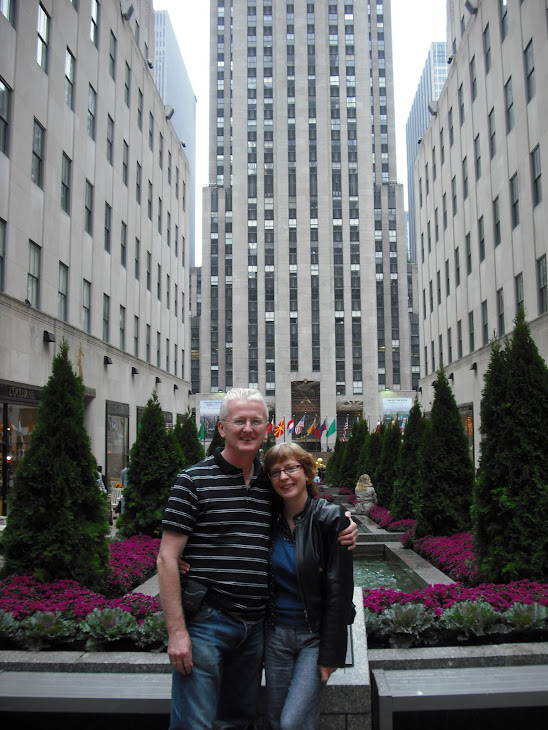 At the APPG Reception
At the APPG ReceptionIf you go to the blog page of the above site you will be able to read Julia Franklin's account of the reception held by the All Party Parliamentary Group on MND last Monday. The Report was launched on specialist palliative care for people with MND and this was formally presented to the Secretary of State for Health, Andrew Lansley. You may recall that Roch gave evidence before the APPG last year and so we were among those invited to attend the reception. It was the first time we ventured out to such an event with Roch in the wheelchair and we were both nervous about it but in practical terms, we encountered no difficulties. The reception was held at No. 1 Great George Street, just off Westminster Square - may I say, the perfect location if some of your attendees are wheelchair bound. On approach it looks inaccessible, having a flight of stone steps up to the entrance, but at the touch of a button these steps recede in turn to disappear into the wall, and are replaced by a lift platform. Very 'Potter-esque', to coin a phrase.


Roch at the APPG reception to launch the Report
It felt odd to be standing by his wheelchair. There were moments, listening to the speeches, when I almost felt there had to have been a mistake - this really shouldn't have anything to do with us - Roch and Deirdre. It felt slightly surreal at times.
Ashley Morgan's speech was very moving. She was diagnosed with MND eight years ago and as Julia says, is a powerful advocate and an inspiring speaker. At times it was not easy to hear. It is not easy to hear people talk about palliative care and end of life issues when they concern your husband directly. Not easy for her to talk of these things, as they affect her directly, too.
One thing I will take away with me was how she spoke of her reaction to the diagnosis. She told us how she had wished she had been one of those people in whom the disease progresses at speed - so it would all be over soon. But now she is grateful for the time she has been given, she is living with MND, not dying of it. I can't help remembering how Chris Woodhead said much the same thing when we heard him speak at an MNDA reception at the House of Commons and how he spoke of being surprised by his feeling of contentment, sitting in his wheelchair in his garden in the sun. Ashley spoke of MND as a gift which makes her treasure life more so that she makes the most of every moment. But there will come a time when it will become not about living with MND but dying of it and it is a frightening prospect, especially when we know that end of life care varies wildly amongst Primary Care Trusts. We've all heard the horror stories, medical staff with no knowledge of the disease, no expertise or understanding. The dying patient suffers and carers are rendered powerless because they are not listened to. Ironically, in most cases, the carer knows more about the disease as it affects their loved one than the nursing staff who attend them.
One thing I will take away with me was how she spoke of her reaction to the diagnosis. She told us how she had wished she had been one of those people in whom the disease progresses at speed - so it would all be over soon. But now she is grateful for the time she has been given, she is living with MND, not dying of it. I can't help remembering how Chris Woodhead said much the same thing when we heard him speak at an MNDA reception at the House of Commons and how he spoke of being surprised by his feeling of contentment, sitting in his wheelchair in his garden in the sun. Ashley spoke of MND as a gift which makes her treasure life more so that she makes the most of every moment. But there will come a time when it will become not about living with MND but dying of it and it is a frightening prospect, especially when we know that end of life care varies wildly amongst Primary Care Trusts. We've all heard the horror stories, medical staff with no knowledge of the disease, no expertise or understanding. The dying patient suffers and carers are rendered powerless because they are not listened to. Ironically, in most cases, the carer knows more about the disease as it affects their loved one than the nursing staff who attend them.
So although it was incredibly moving to hear Ashley speak of how she has conquered the limitations of MND to live as full a life as possible, I think she spoke most powerfully when she spoke of the limitations of the services provided at end of life and how important it is to ensure that when the end does come she can face it with dignity, without suffering and, if possible, at home, surrounded by those who love her. It's what we wish for all of our loved ones who live with the disease. It's what we would wish for ourselves, isn't it? So that was why we were all there - to raise awareness of the issues around end of life and palliative care because we need to ensure better palliative and end of life care for all people with MND and their families.
We need to lobby our MPs to sign Early Day Motion EDM 1943 to support this cause, and ask them to write to their local Primary Care Trusts to find out about availablity and quality of services at a local level.
Please click on the link above and read Julia's account of the reception. Is there anything you can do to raise awareness of the issues? You can follow the link at the end of her blog account to email your MP and find out more about joining the MND Association's campaign.
If you'd like to read the report, click the link below (see if you can spot the input from 'R, 48, London').
http://http//www.mndcampaigns.org/assets/0002/8370/APPG_Report_final_3_.pdf

